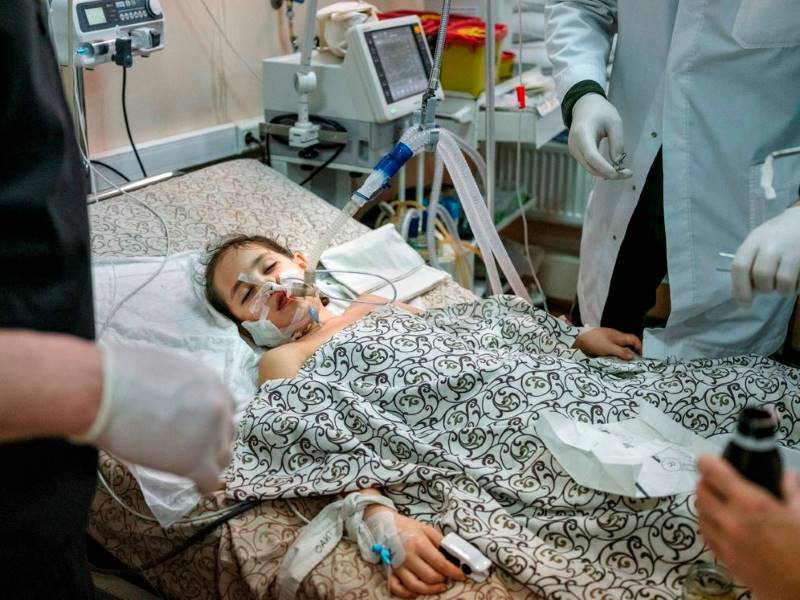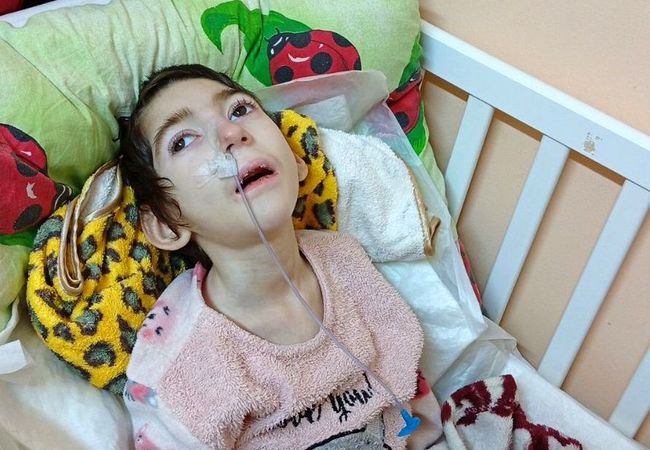
With the beginning of the war, many obstacles appeared in the adoption procedure. And most institutions for orphans were evacuated.
Three weeks before the start of russia's full-scale war against Ukraine, the director of the Kramators Children's Home, Anatoliy Romanov, decided to collect an alarming backpack for each of the 79 pupils - with water, food and hygiene products. "We were preparing because we already had the experience of 2014. We already knew what war is like," Romanov recalls.
"We already knew what war was"
In the spring of 2014, when the pro-russian DPR militants occupied Kramatorsk, the director tried to evacuate his institution to Kharkiv. "They did not allow me to leave - they threatened me, called me to the commandant's office. They said to take the children either to Rostov or to the Crimea. They were on duty near my office and on the street, at the fence, so that I would not “stole” the children - I would not take them to the territory controlled by Ukraine,” says Romanov.
In the end, he managed to negotiate an evacuation. All 33 children were placed in Kharkiv institutions. Kramatorsk was soon liberated, but the evacuated children remained in Kharkiv. Instead, almost 200 children from Makiivka and Donetsk, which are still occupied, were brought to Kramatorsk. "I thought that this time the war in Kramatorsk would last for several months. But this war is much more terrible," says Romanov.
Kramatorsk - Svyatohirsk - Bancheny
On the morning of February 24, Anatoliy Romanov woke up from the explosions and was at the child's home within 15 minutes. Together with his colleagues, the director was waiting for a decision on evacuation. I found a place in advance - a rehabilitation center for children in Sviatohirsk, 50 kilometers from Kramatorsk. "There, the Sviatohirskaya Lavra is the Moscow Patriarchate. Are they really going to bomb it?" - thought Romanov.
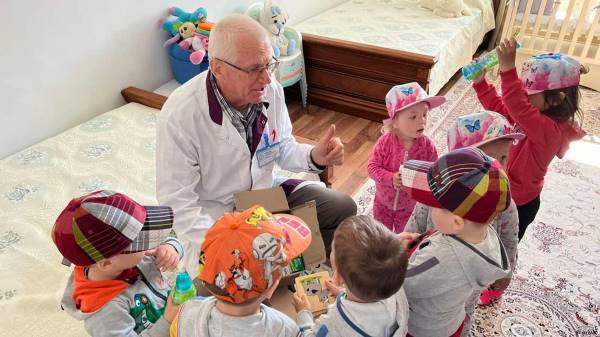
Anatoly Romanov together with pupils of the Kramatorsk children's home
However, two weeks later, children and teachers woke up to the explosions again. The administration decided to evacuate the facility, this time to Chernivtsi. Only a third of the employees agreed, so the director was afraid that he would not be able to cope with all the children. "At the station, I went to the people - there were a lot of them evacuated, and I said: we will transport you free of charge, and you help us with the children. About 15 willing people gathered," Romanov recalls.
In two days, they reached the Holy Ascension Monastery in Bancheny, Chernivtsi region, where they have been living for the past six months. During this time, the children have adapted, although psychologists continue to work with them.
While in evacuation, the children's home continues to receive children who were left without parental care. "I notified the regional administration that we are working," says Romanov. "During this time, we have already taken in six children from Pokrovsk, Donetsk region. One child should be brought from Kostyantynivka. We can shelter about 20 more children, we will even take them ourselves."
Problems with accommodation of evacuated children
Other orphanages were also evacuated from Donetsk region. In general, almost all children deprived of parental care were taken out of the zone of active hostilities. According to the information of the Deputy Minister of Social Policy Ulyana Tokareva, 277 children's institutions were evacuated to safer regions of Ukraine, 198 abroad.
At the same time, 44 children still remain in the Zaporozhye region, which is subject to constant russian attacks. Children are difficult to move because of disabilities associated with complex bone diseases. However, the ministry continues to negotiate on this.
"When an institution with 100, 200, 300 children is moved, it is quite difficult to find appropriate conditions in another region of Ukraine," Tokareva notes. . There actively developed family forms of education for children left without parental care. Institutions for orphans are designed for a very small number of children - no more than 20."
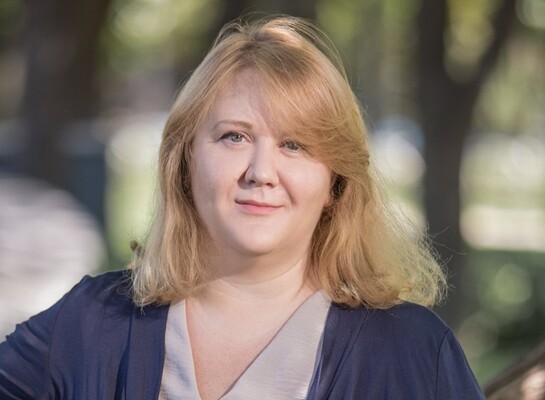
Ulyana Tokareva, Deputy Minister of Social Policy
One of the main problems with the evacuation of such institutions is the lack of places for children with disabilities in safer regions of Ukraine, says Darya Gerasymchuk, the representative of the President of Ukraine on children's rights. Also, in her opinion, there is a lack of invitations for children with disabilities from the international community.
"Ukraine aims for every child to live in a family"
For children who were left without parental care during the war and who could not be placed in institutions due to their evacuation, the "Child is not alone" program operates. This is a joint project of the Office of the President, the President's Commissioner for Children's Rights Daria Gerasimchuk, the Ministry of Social Policy and UNICEF. It was launched already in the first days of a full-scale invasion.

The Lvovuh family is waiting for the air alarm in the corridor of their own apartment
"This is an immediate response to urgent needs," says Gerasimchuk. "Ukraine aims to ensure that every child lives in a family. After all, even in the best institution, the child will not be provided with the necessary family warmth."
Among the participants of the program "The child is not alone" is the couple, who live in Vyshgorod, Kyiv region and have two children of their own - eight-year-old Ivan and five-year-old Varvara. For the last four months, the children have been calling mom and dad by their names - Lyuda and Lyosha. This rule has been in effect since the family sheltered four-year-old Maxim and two-year-old Sofia - a brother and sister who were taken from the family in difficult life circumstances.
"Maxim and Sonya wanted to call us mom and dad, but this cannot be allowed, as they can still be returned to their biological family or given up for adoption to other people. Therefore, we also asked our children to call us by our names," Lyudmila explains.
Lyudmila and Oleksiy were thinking about adopting a third child. They were not afraid of working with the psychological trauma of such a child, because their eldest son has an autistic spectrum disorder. But they were worried about living conditions - whether there would be enough space in their two-room apartment.
More than 4.5 thousand children were left without parental care
The couple found out about the program "The child is not alone" at the beginning of the full-scale invasion of the russian federation into Ukraine. They filled out an application, were selected and trained by UNICEF - the UN children's fund.
Already in the summer, Lyudmila and Oleksiy were called to Ivankovo, a village in the Kyiv region. They were looking for shelter there for Maxim and Sofia. Since the nearest orphanage was evacuated, they were temporarily placed in the hospital.
"When the war began, it became clear that not so much is necessary. If a child is in danger, and we can create a safe environment where he will be fed, sleep in a comfortable bed, receive medical care - we must act. There is no time to improve housing." - says Oleksii.
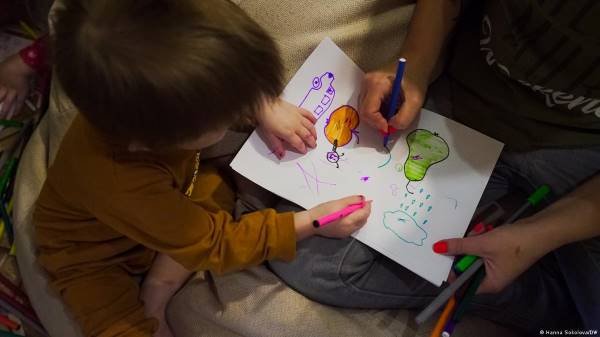
It took some time for Maxim and Sofia to become children again
Lyudmila is indignant that some program participants want to accept a child whose parents died in the war, but not one who was taken from their families in difficult life circumstances and could not be placed in orphanages due to evacuation. She heard how some families refused to shelter Roma children or people with addictions.
In four months, the couple discovered a lot of psychological problems in Maxim and Sofia, who were forced to take care of themselves for a long time. However, the couple and their own children accepted this as a challenge and can already boast of their first achievements.
"Now it has become much easier," Ludmila sums up. "For example, children are no longer afraid of warm water, as they were in the early days - because at home they washed themselves with cold water. They no longer grab all the food they see - because before they were undernourished. They learned to speak about myself, about my feelings."
The family is used to Maxim and Sofia and is thinking about adoption. But their biological parents are not deprived of their rights - the legal process is still ongoing. In addition, in order to adopt two children, the have to move to a larger apartment.
According to National Social Service of Ukraine, more than 4.5 thousand children were left without parental care during the war. Only about a thousand of them lost their parents due to hostilities, the rest of the children were left without parental care for other reasons. Most of the orphans were placed with relatives or friends of the family. Approximately one thousand children ended up in institutions. Only about 300 orphans were placed in temporary families, 27 of them - under the "Child is not alone" program.
"We don't know the real statistics"
Due to hostilities and the occupation of part of Ukraine, this year's statistics on orphans cannot be accurate, says Daria Kasyanova, director of the non-governmental organization "SOS Children's Towns Ukraine", which takes care of such children.
"I'm afraid we don't know the real statistics," says Kasyanova. "Before the war, 10,000 to 12,000 children became orphans a year. Only 5% were biological orphans, when their parents died. And now the war, accordingly, increases poverty, marginalization, diseases. The statistics cannot be lower."

Director of "SOS Children's Towns Ukraine" Daria Kasyanova
Deputy Minister of Social Policy Ulyana Tokareva says that the adoption procedure was not banned because of the start of a full-scale war.
"Furthermore, in August, the Cabinet of Ministers adopted a resolution that expands the possibilities for establishing the status of a child so that he or she can be placed in a family as soon as possible. Consultations and document collection through Diya have started," Tokareva notes. "We have also revised the training program for potential adopters." , so that it can meet all the needs of the child, in particular those related to the war."
At the same time, the deputy minister emphasizes the obstacles to adoption caused by the war. First of all, these are interruptions in the work of children's services and courts, without which this procedure is impossible. A significant part of the children who are eligible for adoption were evacuated abroad. There are currently 16,000 orphans registered for adoption. About six thousand of them were evacuated, only 1.5 thousand - within the borders of Ukraine, notes Tokareva. And adoption is possible only for those children who are in the country.
The war made adoption difficult
"Until May, the system was paralyzed," notes Kasyanova. "It is impossible to collect documents - they are destroyed, registers are closed. It is impossible to get training - in many places social services do not work. Potential adopters lost their property. The child with whom they established contact was taken abroad. Or the family itself left, but the child and the institution were not evacuated."
According to Kasyanova, previously most children were adopted from the eastern and southern regions of Ukraine, which are currently experiencing the most intense russian attacks and where almost all orphanages were evacuated from.
"The procedure is complicated by the requirement not to separate orphaned children - in accordance with the UN Convention on the Rights of the Child," adds Kasyanova. - When one child is in a boarding school, and his younger brother or sister is in a children's home it will be impossible to adopt both children, because children cannot be separated during this procedure."

Daria Gerasimchuk, the Commissioner of the President of Ukraine for Children's Rights: One of the main problems with evacuation is the lack of places for children with disabilities
All this led to a decrease in the number of adopted children. According to Tokareva, since the beginning of this year, Ukrainians have adopted 458 orphans (350 of them - during the full-scale war), foreigners - 94. Last year, as of September 30, Ukrainians adopted 709 children, foreigners - 203 children.
Since the beginning of the full-scale war, Ukraine has banned international adoption. The procedure for the adoption by foreigners of the children Tokareva is talking about was started by February 24. "This ban was introduced deliberately to protect the interests of children," explains the Deputy Minister of Social Policy. "Due to the workload associated with the full-scale russian invasion, the child protection system does not always have time to work efficiently."
At the same time, because of this ban, older children with disabilities lost the opportunity to find a new family. After all, those Ukrainian orphans who have reached the age of five and have been registered for more than a year - that is, those who have not been taken by Ukrainians for several years - could be adopted by foreigners. In addition, foreigners can adopt a small child who has been registered for less than a year, only in case of serious illness. And in institutions in safer regions of Ukraine or abroad, where orphans, in particular those with disabilities, were evacuated, there are usually no proper conditions.


